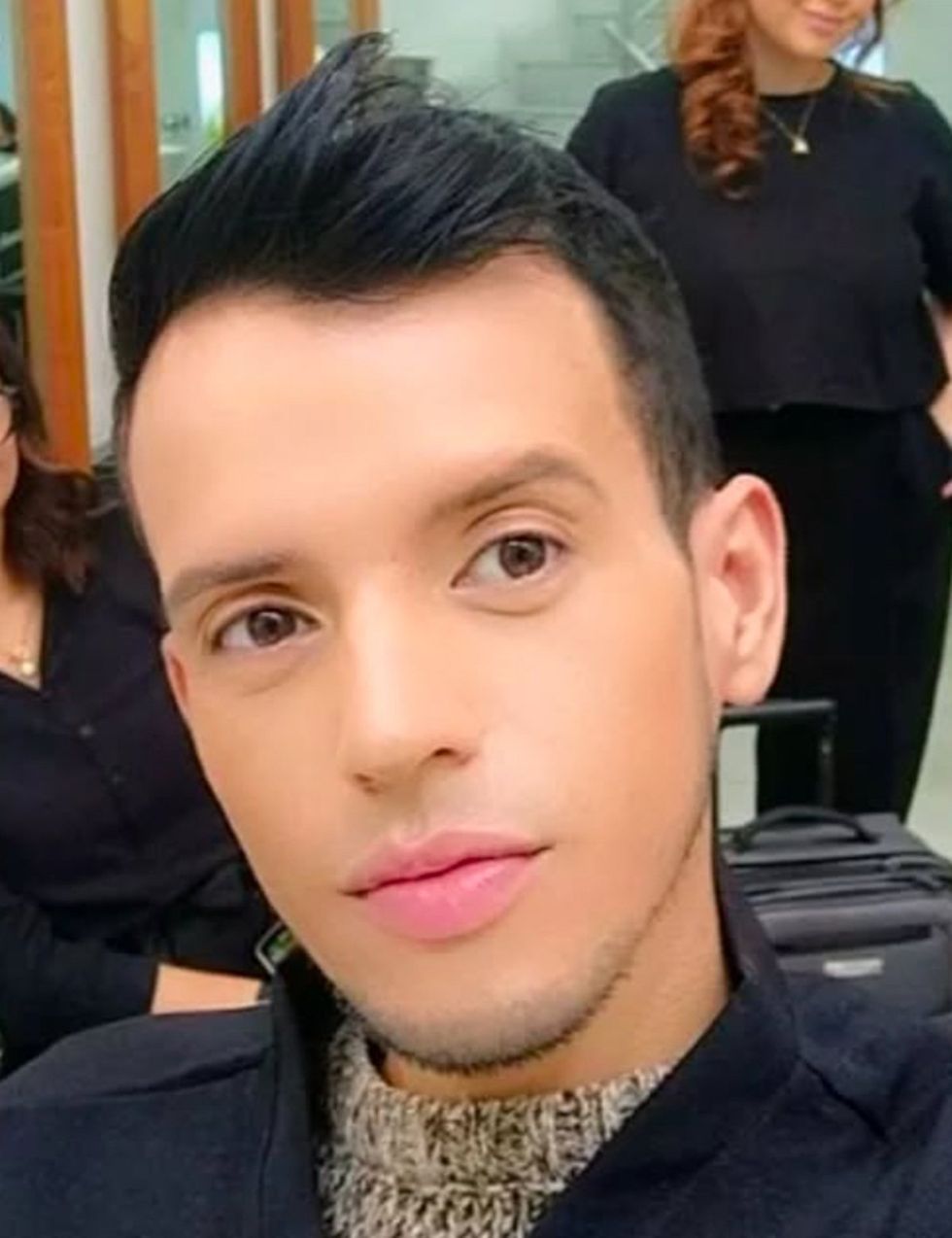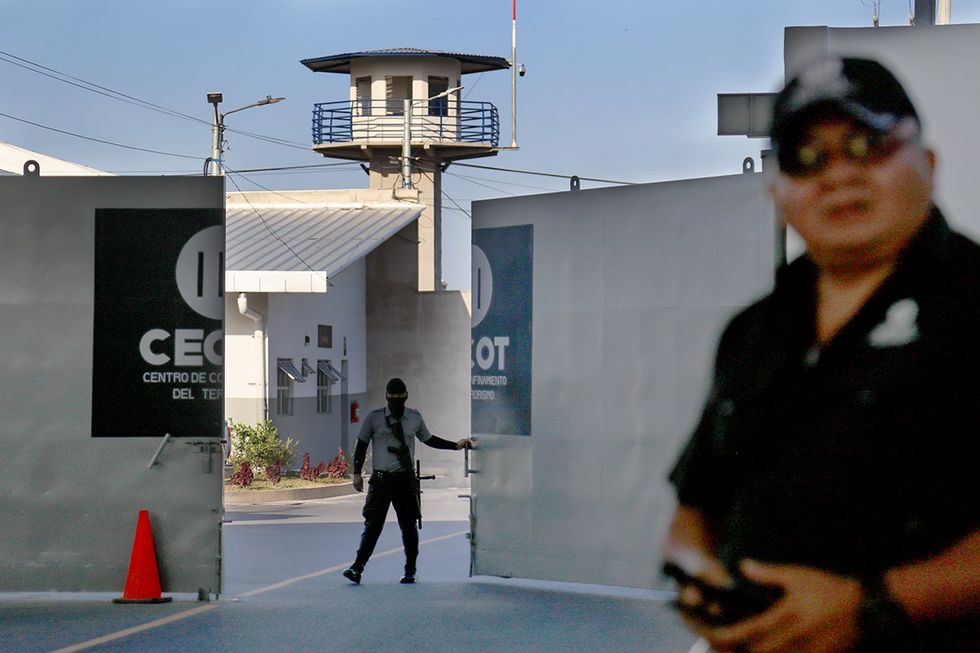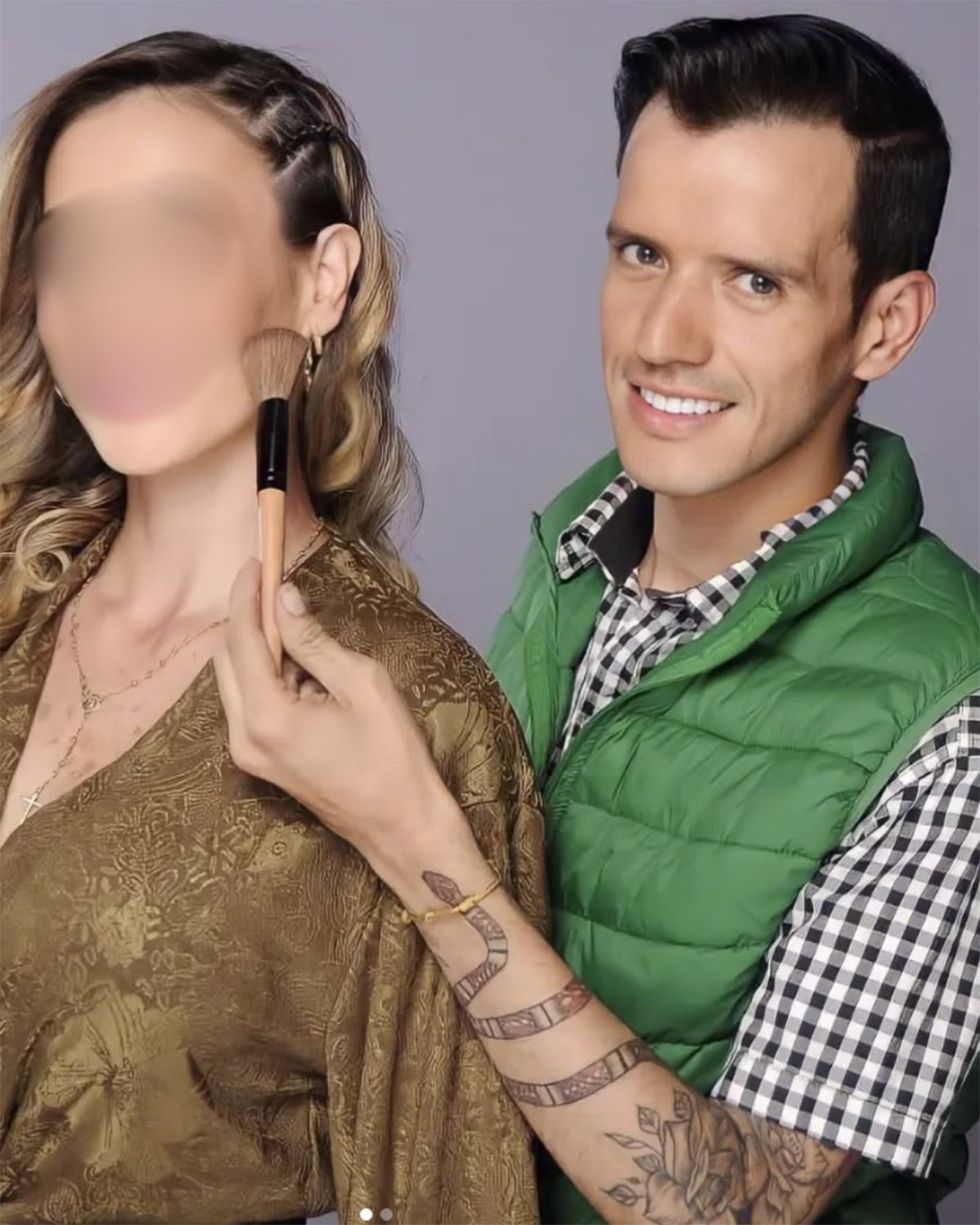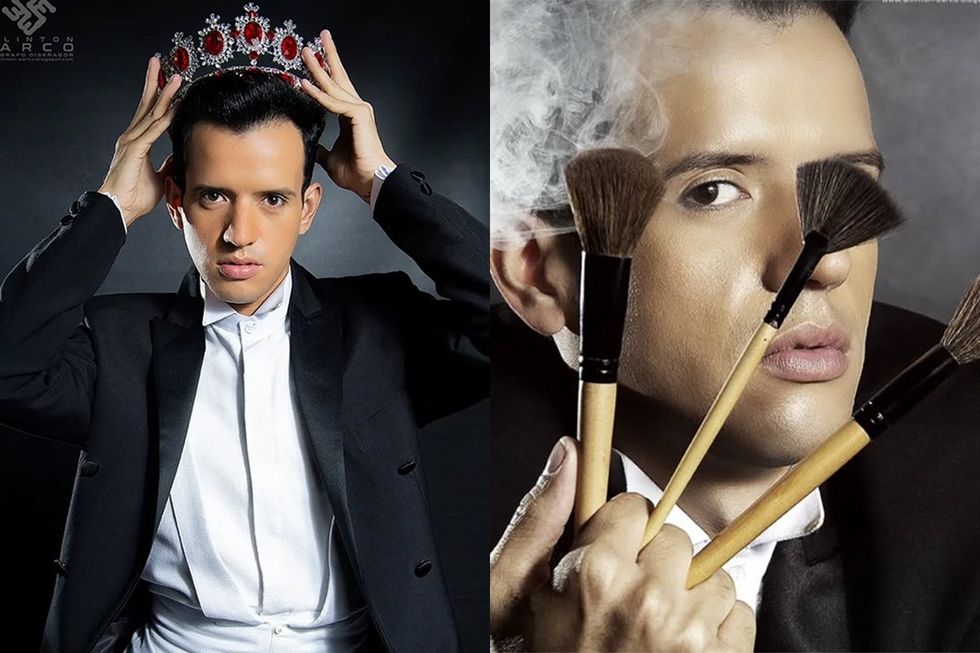The last time anyone spoke to Andry Hernández Romero, he thought he was being put on a plane back to Venezuela. Instead, the 31-year-old gay Venezuelan makeup artist, who came to the United States seeking asylum from political persecution and anti-LGBTQ+ violence, according to his attorney, was forcibly disappeared into one of the world’s toughest prisons.
Keep up with the latest in LGBTQ+ news and politics. Sign up for The Advocate's email newsletter.
Hernández Romero is now believed to be held inside El Salvador’s Terrorism Confinement Center, better known as CECOT — a sprawling, brutalist mega-prison that has been compared to a modern gulag or concentration camp. Constructed by President Nayib Bukele to house alleged gang members, CECOT holds tens of thousands of men in isolation, most without trial. Many have not been convicted of any crimes. There is no phone access. No mail. No visits. No light. No end.
Related: Gay Venezuelan asylum-seeker ‘disappeared’ to Salvadoran mega-prison under Trump order, Maddow reveals
“This is one of the most shocking things I could ever imagine happening to a client,” said Lindsay Toczylowski, a 15-year immigration attorney and executive director of Immigrant Defenders Law Center, in an interview with The Advocate. Toczylowski is representing Hernández Romero in court.

“He never left ICE custody,” she said. “He had no criminal history. And yet they secretly shipped him off to a hellhole, like his life meant nothing.”
She said Hernández Romero, a pageant stylist and lifelong theater performer, had never even been arrested. Now she worries he is shackled and starving in a foreign land he had never set foot in before being deported there by the Trump administration under the pretext of national security and based on nothing more than a tattoo.
Deported because of a crown tattoo
Hernández Romero's journey to CECOT began with a crown — two, in fact. Toczylowski said the tattoos on his wrists, one above his mother’s name and one above his father’s, were part of a tribute to his family and the Three Kings Day pageants in which he had performed since childhood. But to a disgraced former Milwaukee police officer working for private prison contractor CoreCivic, they looked like gang insignia.
Related: Deported gay makeup artist cried for mother in prison, photojournalist says
That officer, who had been fired for crashing his car while intoxicated and later hired by Immigration and Customs Enforcement, submitted a report claiming the crowns suggested membership in Tren de Aragua, a Venezuelan criminal syndicate that the Trump administration has labeled a foreign terrorist organization. That flimsy accusation, uncorroborated by any credible evidence, became Hernández Romero's ticket to indefinite torture.
“He’s not in a gang. He’s a makeup artist who worked at Miss Venezuela,” Toczylowski said. “His social media is full of beauty queens. The only crowns he touches are made of rhinestones.”

Ripped away without warning
Hernández Romero entered the U.S. last year after making an appointment through the Biden administration’s CBP One app. The Trump administration has repurposed the app, now called CBP Home, to get undocumented immigrants to self-deport. His attorney says he followed the rules and did everything right. When he arrived, he was detained at the Otay Mesa Detention Center in California, run by CoreCivic.
He never once stepped outside a detention facility. He was no danger to Americans, his lawyer says.
Related: Bad Wisconsin cop’s tattoo claim helped deport gay asylum-seeker to Salvadoran prison hellscape: report
Hernández Romero was scheduled for an asylum hearing March 13. But when the hearing came, he didn’t appear — not because he skipped court, but because ICE didn’t bring him. His lawyers were confused, and then they panicked.
By Friday of that week, he was no longer listed in the ICE detainee locator. By Sunday, Bukele posted videos of Venezuelan men being brutally marched off planes in shackles on social media. Hernández Romero's lawyers scanned the footage frame by frame.
They saw him.
“He was crying, begging guards, ‘I’m gay! I’m a stylist!’” Toczylowski said. “He was being slapped, his head forcibly shaved. And then he disappeared into the dark.”
Life in the dark
CECOT is not a prison in any traditional sense. It is a vast fortress of pain. Thousands of men sleep on metal slabs in vast concrete rooms. They are beaten for speaking. They are denied food until they are too weak to resist, Toczylowski said. Their heads are shaved, their identities stripped. They are forbidden from speaking, even to each other.
Photojournalist Philip Holsinger, who documented the prison for Time, said Hernández Romero sobbed uncontrollably, praying and calling out for his mother as guards dragged him down a hallway.
Hernández Romero's mother learned of his fate only when Toczylowski called to tell her he was in El Salvador.
ICE has refused to confirm anything to his attorneys. There is no removal order and no legal paperwork. The Department of Homeland Security and the White House did not respond to The Advocate’s requests for comment.
The Trump administration claims the Alien Enemies Act — a law passed in 1798 to detain foreign nationals during war — gives it unchecked power to disappear people like Hernández Romero without trial. ICE has since declared it will not facilitate any communication with him or make him available for court appearances, his lawyer said.
“It is terrifying,” Toczylowski said. “Because we have no idea what is happening to him.”

Despite the trauma, Toczylowski and her team are fighting. They’ve filed court motions. They’ve contacted elected officials. But the wheels of justice move slowly — too slowly for someone caged in a windowless concrete block, surrounded by armed guards, his future erased.
“Every single day he remains there, his life is at risk,” she said. “And if anything happens to him, it is on President Trump, Secretary of Homeland Security [Kristi] Noem, and Secretary of State [Marco] Rubio.”
Hernández Romero's case, she warned, is not just about one person. “If they can do this to him, they can do it to anyone,” she said. “Green card holders. U.S. citizens. Anyone.”
The weight of it all
In a quiet moment during the interview, Toczylowski reflected on the emotional toll.
“I have not had a case or a situation that has weighed on me like this since we were at the epicenter of the family separation crisis,” she said. “We were helping kids in shelters who were crying for their parents. I thought that was the most shocking thing I’d ever witnessed in my career. But what has happened to Andry? It tops that.”
She paused. “This is as bad as it gets.”

What people can do
Hernández Romero doesn’t know that people are fighting for him. He doesn’t know that his theater troupe in Venezuela is staging rallies in his honor, wearing crowns in protest. He doesn’t know that, according to Toczylowski, churches in Canada, Spain, and the Netherlands have offered him sanctuary. He doesn’t know that dozens of strangers across the U.S. have offered to house him if he ever returns.
“We just want him to know he’s not alone,” Toczylowski said. “He’s loved. We’re fighting like hell to bring him home.”
ImmDef continues to represent Hernández Romero and others like him pro bono. The nonprofit organization accepts financial contributions and urges those who support Hernández Romero to share his story, contact elected officials, and support legal efforts to bring him back.
“We have started representing other people who are also in El Salvador, whose stories we are just learning,” Toczylowski said. “We obviously do all of this work pro bono. So, if people want to support organizations like us that fight to get due process for people and that provide free lawyers to people, they should. We could certainly use the support."
On Saturday, the U.S. Supreme Court issued a temporary pause on further deportations under the Alien Enemies Act. The court’s order came after the American Civil Liberties Union filed an emergency appeal on behalf of dozens of men being held in Texas, many of whom were reportedly being bused to airports without notice or hearings.
Justices Clarence Thomas and Samuel Alito dissented.
The court’s move signals new scrutiny of Trump’s use of executive wartime powers to bypass asylum law. While the justices have not yet ruled on the law’s constitutionality, the pause blocks removals “until further order of this court.”
On Monday, four Democratic U.S. lawmakers traveled to El Salvador to investigate the situation for those detained, including to conduct a welfare check on Hernández Romero. U.S. Reps. Yassamin Ansari of Arizona, Robert Garcia of California, Maxwell Frost of Florida, and Maxine Dexter of Oregon sent a letter to Rubio requesting that they or Hernández Romero's lawyers be able to see him.
"As a gay man, Mr. Hernández Romero is at particular risk of persecution if deported or imprisoned in El Salvador, a country where LGBTQIA+ people can face 'torture, inhuman or degrading treatment, excessive use of force, illegal and arbitrary arrests and other forms of abuse, much of it committed by public security agents,'" the letter states.
Don’t forget these men
Beyond financial support, Toczylowski said Hernández Romero's case needs continued attention.
“We need elected officials — like Sen. [Chris] Van Hollen did — to go to El Salvador and demand answers,” she said. “And if we’re able to get an elected official to go down like Sen. Van Hollen did, and they're able to speak with him, I want him to know how many people — his team here at ImmDef, his family, and so many around the world — are fighting for him so that he doesn’t give up hope, so that he doesn’t give up the will to survive.”
Van Hollen, a Democratic U.S. senator from Maryland, traveled to San Salvador last week to meet with Kilmar Abrego Garcia, another man deported under similar circumstances. Van Hollen confirmed that Abrego Garcia had been held in CECOT for weeks, isolated, taunted, and emotionally traumatized. He was later transferred to a lower-level facility, still in isolation, but reportedly improved.
“He was clearly strengthened by the fact that people were fighting to ensure his rights are protected,” Van Hollen said at a news conference after returning.
Toczylowski said she hopes someone will be allowed to speak to Hernández Romero soon and that he will learn he hasn’t been forgotten.
“If it were me, I’d want someone to tell my story. I’d want someone to know I was human,” she said. “If it can happen to Andry — it can happen to a green card holder. It can happen to a U.S. citizen. That should chill us all.”
















Charlie Kirk DID say stoning gay people was the 'perfect law' — and these other heinous quotes
These are some of his worst comments about LGBTQ+ people made by Charlie Kirk.